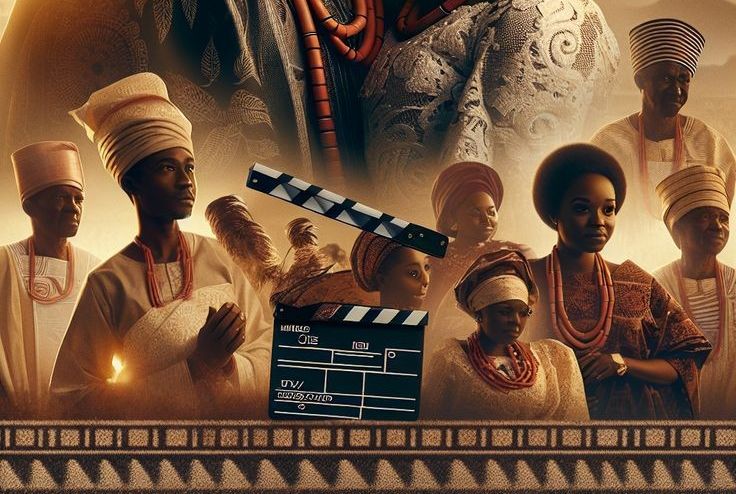The Nollywood industry can be traced back to a time when colonial filmmakers produced films for local audiences. Movies like Palaver in 1926 and Sanders of the River in 1935, cast Nigerian actors in speaking roles and were shown in halls nationwide to teeming audiences.
During this era, religion played a huge role in the expression of Nigerian cinema culture, as the Christian missionaries used filmmaking for propaganda. What’s more?
Relax and stick around as we’ll be delving deeper into the rich history of the Nollywood industry, including their achievements so far.
Table of Contents
The Birth of the Nollywood Industry: A Brief History
Over time, cinema became a common feature of social life in Nigeria, particularly in Lagos. This development established big commercial cinema houses with branches in strategic parts of the country. Between the 1930s and 1940s, Nigerian cinema came in the form of playing companies and travelling theatre troupes.
These plays, funded by the court, church, or audiences, were promoted via adverts and posters disseminating information to potential audiences. Nollywood, Nigeria’s budding film industry has become a global phenomenon, taking giant strides as the biggest film industry in the African continent.
Its unique storytelling coupled with its rich cultural heritage has captivated its audience. In the 1960s, Nollywood movies were being created by historical filmmakers like Herbert Ogunde, Ola Balogun, Jab Adu, Moses Olaiya and Eddie Ugboma. They were regarded as the first generation Nigerian Filmmakers.
The Nigerian cinema grew rapidly with several film houses built following Nigeria’s Independence with more indigenous film content. The Nollywood industry took a turn in the 1990s and has grown to be recognized as one of the most influential film industries in the world. The films are relatable to the average Nigerian, tackling social issues and the everyday problems faced.
Ready to meet passionate readers or writers like you? Join our WhatsApp community; it’s the best place for you to be.
These movies were initially distributed on VHS (Video Home System) tapes and later on DVDs (Digital Video Disc), making them accessible to a wide audience across Nigeria and beyond. This grassroots approach democratized filmmaking, allowing aspiring directors, actors, and producers to enter the industry with relative ease.
The Nollywood industry’s breakthrough came in the mid-1990s with the release of “Living in Bondage,” directed by Chris Obi Rapu. This dramatic thriller explored themes of greed, power, and spirituality. Moreso, this film marked the beginning of a new era for Nigerian cinema, sparking a wave of creativity and entrepreneurial spirit among Nigerian filmmakers and actors.
The Rise of the Nollywood Industry: Progresses So Far
Dripping from its success in the 90s, the demand for Nigerian movies grew from low-budget movies and the Nigerian cinema sphere skyrocketed with thousands of movies across various genres. This surge was a result of the need for locally produced content.
From romance to drama, comedy, fiction and non-fiction, the diversity of the Nollywood industry was known both domestically and internationally. In the early 2000s, Nollywood began to garner international recognition with its films appearing at several international movie festivals.
Nollywood gained global attention because of its unique story-telling style which resonated with audiences worldwide. It captured the essence of the “Naija spirit” and the fact that no one could tell our story better than us. The Nollywood industry evolved and leveraged digital streaming platforms, technology and partnerships to reach a wider audience and generate more revenue.
This has provided the opportunity for the industry to monetize its content and expand. Nollywood also saw the rise of talented A-list actors who have been able to break into the international scene. With our rich cultural heritage of storytelling, we have been able to tell our story to the world in our various indigenous languages.
The Nollywood industry’s influence has exceeded the borders of the African continent, gaining popularity in the diaspora. This has enhanced collaboration with filmmakers from other film industries like Hollywood and Bollywood. Movies like Namaste Wahala (2020), and Postcards (2024) are a result of such collaboration.
Read also: Top 15 Nigerian Movies to Watch in 2023
The Achievements of the Nollywood Industry in Nigeria
From the humble beginnings of low-budget video tapes to being the second-largest film industry in the world, Nollywood in Nigeria is the perfect definition of a success story. Nollywood has become a beacon of hope for creatives and entrepreneurs who have all contributed to the growth of the industry.
The recent Africa Magic Viewers Choice Awards event celebrated not only 10 years of Africa’s talents in the film industry but goes on to prove that Nollywood is the strength of Africa’s film industry. Over the decades, we have witnessed the trajectory of growth that only hard work and dedication can bring. Moreover, actors, producers, directors and film houses have proven to us that greatness can be achieved.
Read also: 10 Nollywood Movies about Entrepreneurs Nigerians Should Watch
The Nollywood industry has also carved out its significance as the leading driver of Nigeria’s entertainment sector by contributing billions of naira to the country’s annual GDP. The Nigerian cinema has also created employment opportunities for thousands of people because as they say, “it takes a village to make a movie.”
From the scriptwriters to the actors, costume designers to the makeup artists, directors of photography, technicians and location directors, Nollywood in Nigeria has given these people an opportunity to chase their passions and earn a livelihood.
Nollywood has also enabled the evolution of Nigerian cinema, from hanging around viewing centres to watch movies in the 1990’s, we have evolved to producing ground-breaking movies selling out the cinemas and breaking records. Movies like “A Tribe Called Judah” holding the current record of the highest-grossing movie in 2023 surpassing a billion naira is proof that Nollywood has just begun.
Nollywood in Nigeria has become a source of inspiration to other film industries in the continent. The Nigerian film industry has inspired a new generation of filmmakers and storytellers across Africa. With this feat, we prove that we don’t have to change our story to fit in. We’ve only got to encourage creativity and innovation in the film industry.
Do you love this post and won’t mind getting more premium insights dropped into your inbox? Good! Simply subscribe to our newsletter today and let’s keep you updated.
Conclusion
Despite its various achievements and groundbreaking success, Nollywood in Nigeria is not without its challenges. There are several factors like piracy, infrastructural limitations and minimal distribution channels. These challenges affect the optimization of creativity and discourage investments.
However, the future of the Nollywood industry is promising. With the advancement of technology, the industry continues to improve and remains the cultural story-telling powerhouse of Africa.
Nollywood is rewriting and shaping the narrative of African cinema, whilst putting Nigeria on the global film scene. The movie industry has played its role in showcasing Nigeria’s diverse cultures, traditions and languages, and promoting cultural exchange both domestically and internationally.
Edited by Priscilla Ajayi.
About Author
- Chovwe is content writer and a Fashion Designer. She's also a Chartered Mediator and Conciliator. She's an advocate for peace and loves art. She owns a fashion brand and is very passionate about what she does.
Latest entries





